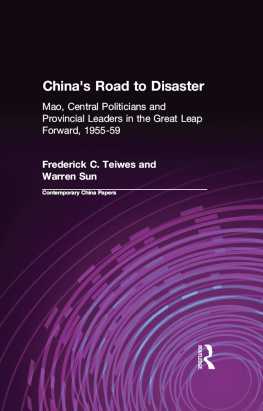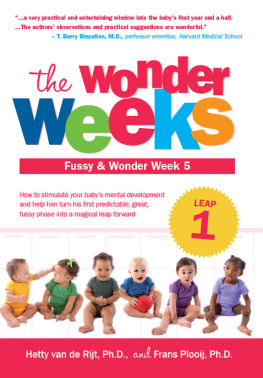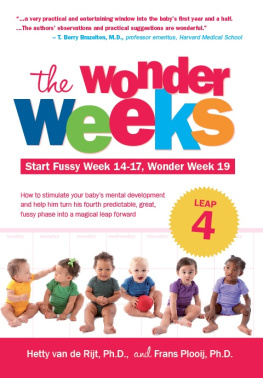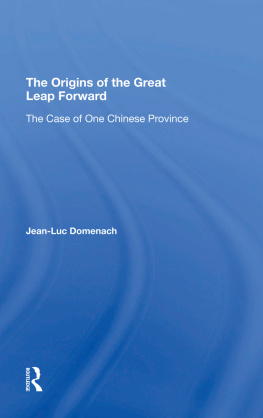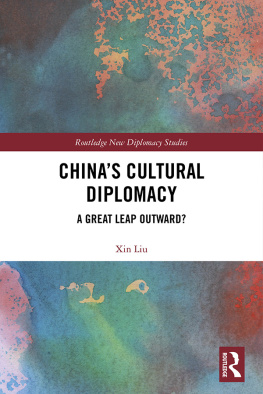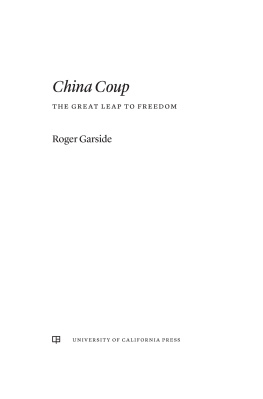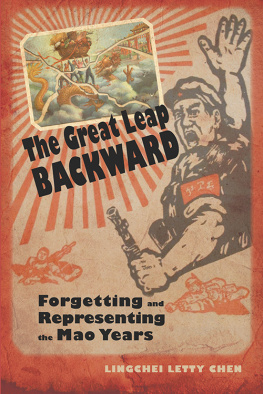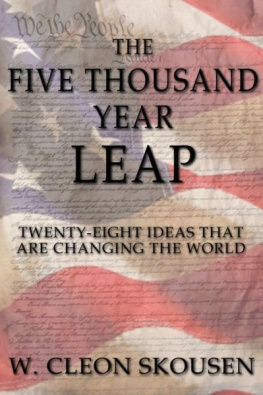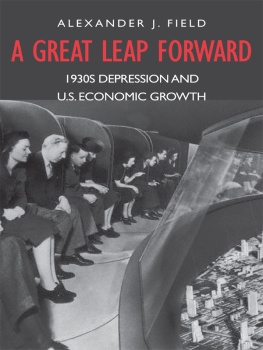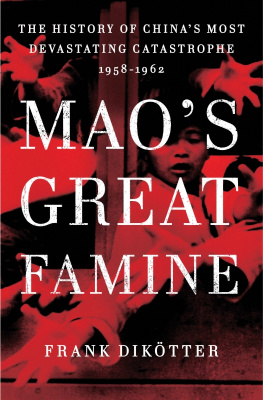Chinas Road to DISASTER
Contemporary China Papers
Australian National University
Series Editor: Jonathan Unger
Australian National University
Titles in this series published by M. E. Sharpe are:
No. 20: THE PRO-DEMOCRACY PROTESTS IN CHINA
Reports from the Provinces
Edited by Jonathan Unger
No. 21: USING THE PAST TO SERVE THE PRESENT
Historiography and Politics in Contemporary China
Edited by Jonathan Unger
No. 22: DIRECTORY OF OFFICIALS AND ORGANIZATIONS IN CHINA
A Quarter-Century Guide
Malcolm Lamb
No. 23: CHINESE NATIONALISM
Edited by Jonathan Unger
No. 24: CHINAS ROAD TO DISASTER
Mao, Central Politicians, and Provincial Leaders in the Unfolding of the Great Leap Forward, 19551959
Frederick C. Teiwes with Warren Sun
Chinas Road to DISASTER
Mao, Central Politicians, and Provincial Leaders in the Unfolding of the Great Leap Forward 19551959
Frederick C. Teiwes with Warren Sun
An East Gate Book
First published 1999 by M.E. Sharpe
Published 2015 by Routledge
2 Park Square, Milton Park, Abingdon, Oxon OX14 4RN
711 Third Avenue, New York, NY 10017, USA
Routledge is an imprint of the Taylor & Francis Group, an informa business
Copyright 1999 Taylor & Francis. All rights reserved.
No part of this book may be reprinted or reproduced or utilised in any form or by any electronic, mechanical, or other means, now known or hereafter invented, including photocopying and recording, or in any information storage or retrieval system, without permission in writing from the publishers.
Notices
No responsibility is assumed by the publisher for any injury and/or damage to persons or property as a matter of products liability, negligence or otherwise, or from any use of operation of any methods, products, instructions or ideas contained in the material herein.
Practitioners and researchers must always rely on their own experience and knowledge in evaluating and using any information, methods, compounds, or experiments described herein. In using such information or methods they should be mindful of their own safety and the safety of others, including parties for whom they have a professional responsibility.
Product or corporate names may be trademarks or registered trademarks, and are used only for identification and explanation without intent to infringe.
Library of Congress Cataloging-in-Publication Data
Teiwes, Frederick C.
Chinas road to disaster : Mao, central politicians, and provincial leaders in the unfolding of the great leap forward, 19551959 / Frederick C. Teiwes with Warren Sun.
p. cm. (Contemporary China papers)
An East gate book.
Includes bibliographical references and index.
ISBN 0-7656-0201-6 (hardcover : alk. paper).
ISBN 0-7656-0202-4 (pbk. : alk. paper)
1. ChinaPolitics and government19491976. I. Sun, Warren. II. Title. III. Series.
DS777.75.T43 1998
951.055dc21 98-15299
CIP
ISBN 13: 9780765602022 (pbk)
ISBN 13: 9780765602015 (hbk)
To Our Respective Teachers
Fred Teiwes Honors Doak Barnett
Warren Sun Honors Wang Gungwu
CONTENTS
Organizations and Policies
CCP | Chinese Communist Party |
FFYP | First Five-Year Plan |
ICBM | Intercontinental Ballistic Missile |
NDU | National Defense University |
NPC | National Peoples Congress |
PLA | Peoples Liberation Army |
PRC | Peoples Republic of China |
SEC | State Economic Commission |
SFYP | Second Five-Year Plan |
SPC | State Planning Commission |
Publications and Publishing Agencies
AJCA | The Australian Journal of Chinese Affairs |
CB | Current Background |
CQ | The China Quarterly |
NCNA | New China News Agency |
PDA | Communist China 19551959: Policy Documents with Analysis |
SCMP | Survey of China Mainland Press |
SS | The Secret Speeches of Chairman Mao |
SW | Selected Works of Mao Tsetung |
WM | The Writings of Mao Zedong |
XHBYK | Xinhua banyuekan [New China Semi-Monthly] |
ZGDSRWZ | Zhonggong dangshi renwu zhuan [Biographies of Personalities in CCP History] |
ZGDSYJ | Zhonggong dangshi yanjiu [Research on CCP History] |
More than with most studies, this book began as a result of a number of different intellectual and practical considerations, and took on more as the research progressed. The initial practical impetus came from the need for a paper to be delivered to a conference on Chinese Communist history during the pre-Cultural Revolution period. This led fairly directly to an examination of the moderate economic policies of 195657 the program of opposing rash advance. The intellectual impetus for this was first in the recognition that this issue had only been dealt with in passing in our previous work, and that on the surface the events of this period as depicted in the existing literature were at considerable variance with our understanding of a completely dominant Mao Zedong as the pivot of Chinese elite politics. This, in turn, was linked to a certain frustration with the residual influence of the two line struggle model which we had hoped to demolish in various earlier works. Simply put, would a detailed examination of economic policy in this period confirm our overall assessment of Chinese politics, and would it provide sufficient evidence to convince the sceptics?
As the research developed, particularly as a result of extensive interviews with a significant participant in the economic policy-making process in both 195657 and 195859, our attention was increasingly drawn to the momentous drama of the Great Leap Forward which followed upon and was intimately linked to opposing rash advance. Not least, we became transfixed by the question of how such an enormous tragedy as the Great Leap famine which claimed millions of lives came about and who was responsible. In some senses the answers have long been apparent, but a deeper political understanding has been missing. Indeed, for such a watershed event it is remarkable how little sustained and detailed attention has been given to the politics of the Great Leap Forward. The conventional wisdom adopted by most accounts did little more than adapt with limited research the Cultural Revolution perspective of, crudely put, anti-Maoist elements attacking the Chairman and implementing the moderate policies of 195657, Mao defeating his opponents by the end of 1957 and launching the radical leap and enforcing his views until 1960, and then being again shunted to the sidelines by a dominant group of moderates as the disasters of the leap became undeniable. Needless to say, we believed this wide of the mark, and in the event our detailed examination provides a multifaceted analysis of just how far such interpretations stray from the reality.

